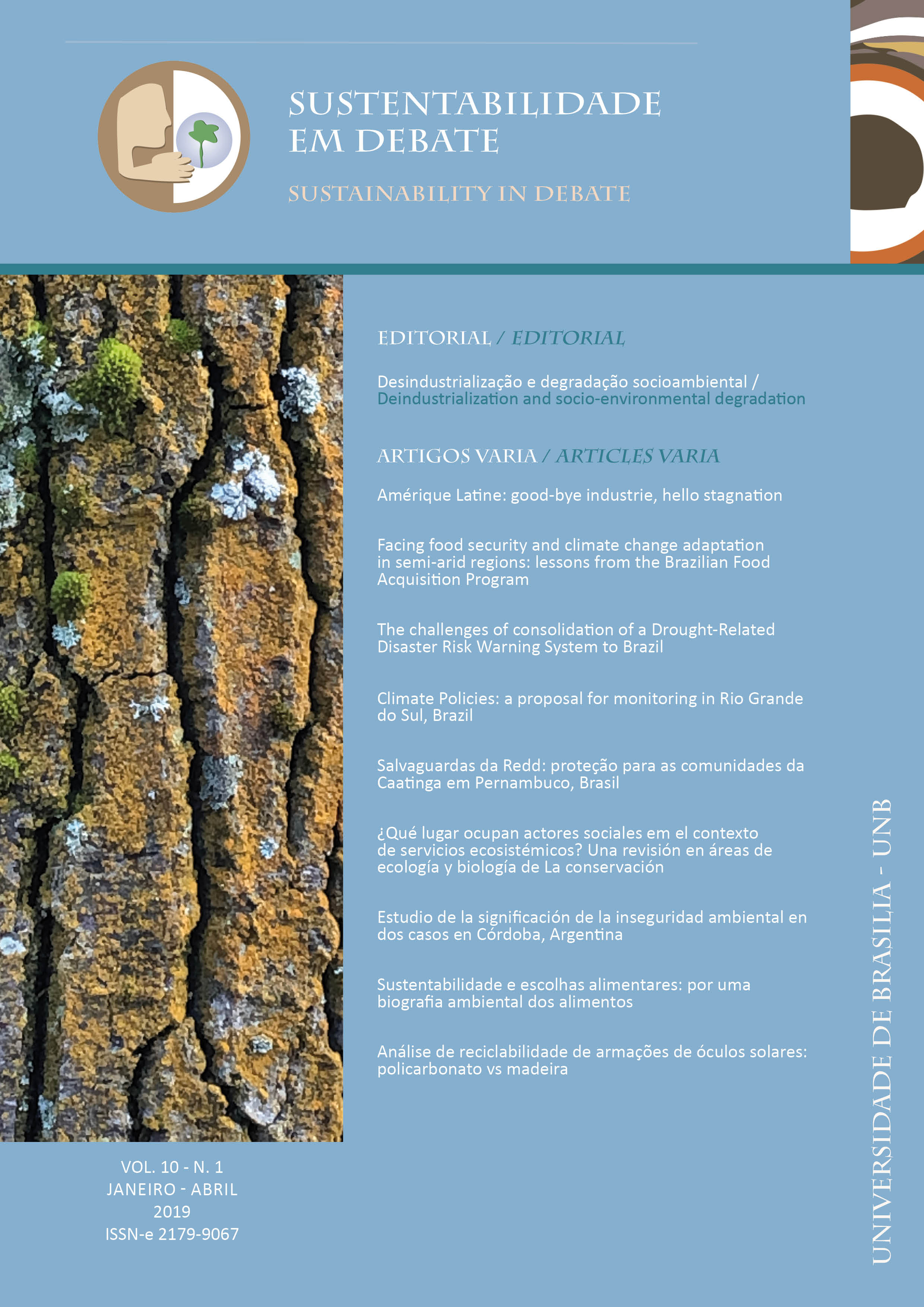Amérique Latine: good-bye industrie, hello stagnation
DOI :
https://doi.org/10.18472/SustDeb.v10n1.2019.23989Mots-clés :
Désindustrialisation, Reprimarisation, Distribution des revenus, Emplois, Déclassement,Résumé
Les 7 plaies de l’Amérique latine : des pays profondément inégalitaires, une informalité, une pauvreté importantes qui tend à croitre de nouveau et un déclassement des classes moyennes en augmentation, une tendance à la stagnation du PIB par tête sur longue période, une dépendance accrue vis-à -vis de l’exportation de matières premières ou des « remessas », un mépris de l’environnement et une remise en cause des droits nouveaux obtenus par les populations indiennes, une intégration dans les chaînes internationales de valeurs faible, enfin une désindustrialisation précoce. Qu’elles soient relativement fermées commercialement (et ouvertes financièrement) ou davantage ouvertes, ces économies subissent certains des effets délétères de la globalisation. Cet article privilégie l’étude de l’industrie et de la reprimarisation et ses effets sur l’emploi et la distribution des revenus et analyse les conditions pour que ces pays cessent de passer à coté de la révolution industrielle en cours.
Téléchargements
Références
ABELES, M; PEREZ CALVANTEY, E; VALDECANTES, S. Estudios sobre financiarizacion, Cepal, 2018.
AMARANTE V.; et COLACCCE, M. « Mas o menos desigualidades ? una revision sobre la desigualidad de los ingresos a nivel global, regional y nacional. » Revista de La Cepal, n°124, 7-35, 2018.
BAIROCH, P., 2005, Mythes et paradoxes de l’Histoire économique, éditions La découverte
BERGER, T.; CHEN, C et Frey CB. : « Cities, Industrialization and Job Creation : Evidence from Emerging Countries », mimeo, Oxford Martin School, p. 1-25, 2017.
CARBONNIER, G.; CAMPODONICO, H. et TEZANOS VAZQUEZ, S. Alternative Pathways to Sustainable Development : Lessons from Latin America, in International Delopment Policy, n°9 ed. Brill/Nijhoff, 2017.
Carta IEDI, n°892, 2018.
CASTILLO, M. et MARTINS, A. « Premature Desindustrialization in Latin America », Cepal, n°205, 1-23, 2016.
COATZ, D.; SCHEINGART, D. « La industria argentina en el siglo XXI: entre los avatares de la coyuntura y los desafíos estructurales », Boletín informativo Techint,n°353, 2016, pp. 61-100, 2016.
DIAZ ALEJANDRO, C. « Good by financial repression, hello financial crisis », Journal of Development Economic, vol 19, n°1, 1-24, 1985.
FRENKEL, R. et RAPETTI, M. La principal amenaza de America Latina en la próxima década: fragilidad externa o primarizacion?, Working paper, CEDES, 1-30, 2011.
HAUSMANN, R. et all. The Atlas of Economic Complexity, Mapping Paths to Perspectives, Center for International Development, Harvard University, Harvard Kennedy School, Macro Connections MIT Media Lab, 2014.
Informe Geres, Argentina.
Informe BANXICO, Mexico.
LUQUE, Carlos; SILBER, S. e ZAGHA, R. « Retomar o crescimento deve ser objetivo central », O Valor, 14 fevrier, 2019.
OCDE (Organisation de coopération et de développement économiques), CAF (Corporacion Andinade Fomento) et CEPAL. Latin American Economic Outlook (2016), Towards a New Partnership with China, 2016.
ROCHA, S. Allocations sociales et pauvreté au Brésil, ed.FMSH, 2014.
SALAMA, P. O desafio das desigualidades, America Latina/Asia, uma comparacao economica, editor Perspectiva, 2011 ( em frances, 2006).
SALAMA P. Les économies émergentes latino-américaines, entre cigales et fourmis, édition Colin, 2012.
SALAMA, P. « Nuevas tecnologías: ¿bipolarización de empleos e ingresos del trabajo? » Revista Problemas del desarrollo, Mexico, 1-24, 2018.
SCHTEINGART, D. « El rompezadas del mercado laboral latino-americano », Nueva sociedad n°275, 92-106, 2018.
SVAMPA. M. « Consenso de los commodities y lenguages de valoracion en America Latina », Nueva Sociedad ,n°244, 30-46, 2013.
TOOZE, A. Crashed, comment une décennie de crise financière a changé le monde, éditions Les belles lettres, 2018.
WTR/OMC: base de données.
Téléchargements
Publié-e
Comment citer
Numéro
Rubrique
Licence
© Sustentabilidade em Debate 2019

Cette œuvre est sous licence Creative Commons Attribution - Pas d'Utilisation Commerciale - Pas de Modification 4.0 International.
SUSTAINABILITY IN DEBATE – Copyright Statement
The submission of original scientific work(s) by the authors, as the copyright holders of the text(s) sent to the journal, under the terms of Law 9.610/98, implies in the concession of copyrights of printed and/or digital publication to the Sustainability in Debate Journal of the article(s) approved for publication purposes, in a single issue of the journal. Furthermore, approved scientific work(s) will be released without any charge, or any kind of copyright reimbursement, through the journal’s website, for reading, printing and/or downloading of the text file, from the date of acceptance for publication purposes. Therefore, the authors, when submitting the article (s) to the journal, and gratuitous assignment of copyrights related to the submitted scientific work, are fully aware that they will not be remunerated for the publication of the article(s) in the journal.
The Sustainability in Debate Journal is licensed under Creative Commons License – Non-Commercial-No-Derivation Attribution (Derivative Work Ban) 3.0 Brazil, aiming at dissemination of scientific knowledge, as indicated on the journal's website, which allows the text to be shared, and be recognized in regards to its authorship and original publication in this journal.
Authors are allowed to sign additional contracts separately, for non-exclusive distribution of the works published in the Sustainability in Debate Journal (for example, in a book chapter), provided that it is expressed the texts were originally published in this journal. Authors are allowed and encouraged to publish and distribute their text online, following publication in Sustainability in Debate (e.g. in institutional repositories or their personal pages). The authors expressly agree to the terms of this Copyright Statement, which will be applied following the submission and publishing by this journal.









